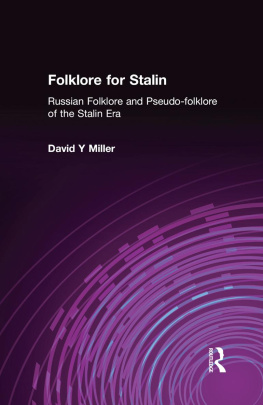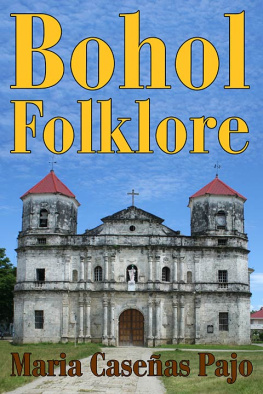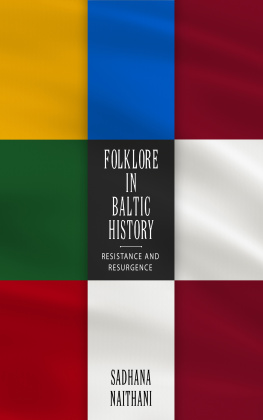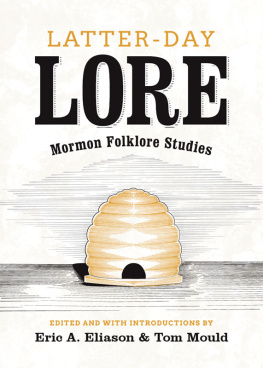This book is a publication of
Indiana University Press
Office of Scholarly Publishing
Herman B Wells Library 350
1320 East 10th Street
Bloomington, Indiana 47405 USA
iupress.org
2021 by Indiana University Press
All rights reserved
No part of this book may be reproduced or utilized in any form or by any means, electronic or mechanical, including photocopying and recording, or by any information storage and retrieval system, without permission in writing from the publisher. The paper used in this publication meets the minimum requirements of the American National Standard for Information SciencesPermanence of Paper for Printed Library Materials, ANSI Z39.48-1992.
An earlier version of part of the Introduction was published in Timothy Lloyds essay about the American Folklore Society and the field of folklore studies in Learned Societies Beyond the Numbers, a 2016 publication he edited for the American Council of Learned Societies (http://www.acls.org/uploadedFiles/InfoBoxes/Learned_Societies/Learned_Societies_Beyond_web.pdf), and is included here with the permission of the Council.
Manufactured in the United States of America
Library of Congress Cataloging-in-Publication Data
Names: Lloyd, Timothy Charles, editor.
Title: What folklorists do : professional possibilities in folklore studies / edited by Timothy Lloyd.
Description: Bloomington, Indiana : Indiana University Press, [2021]
Identifiers: LCCN 2021012952 (print) | LCCN 2021012953 (ebook) | ISBN 9780253058430 (hardback) | ISBN 9780253058423 (paperback) | ISBN 9780253058416 (ebook)
Subjects: LCSH: FolkloreVocational guidance. | FolkloreStudy and teaching. | FolkloristsProfessional relationships.
Classification: LCC GR50 .W43 2021 (print) | LCC GR50 (ebook) | DDC 398.023dc23
LC record available at https://lccn.loc.gov/2021012952
LC ebook record available at https://lccn.loc.gov/2021012953
First printing 2021
CONTENTS
Acknowledgments
Introduction: Timothy Lloyd
oneResearching and Teaching
Doing Fieldwork: Tom Mould
Integrating Fieldwork and Library Research: Elissa R. Henken
Collaborating across Disciplines: Sheila Bock
Practicing Internationalism: Dorothy Noyes
Connecting Folklore Studies to Digital Humanities: John Laudun
Using Big Data in Folklore Scholarship: Timothy R. Tangherlini
Understanding the Information Technology World Ethnographically: Meghan McGrath
Doing Public Humanities: Danille Christensen
Serving a Campus as an International Scholar: Ziying You
Working as an Independent Scholar: Luisa Del Giudice
Teaching at a Community College: David J. Puglia
Teaching Undergraduate Students: David Todd Lawrence
Teaching Graduate Students: Ray Cashman
Teaching in an Interdisciplinary Department: Tom DuBois
Teaching Medical Professionals: Bonnie Blair OConnor
Teaching Writing: Martha C. Sims
Integrating Vernacular and Mainstream Science in Teaching: Sandra Bartlett Atwood
twoLeading and Managing
Leading at a University: Patricia A. Turner
Chairing a Department: Debra Lattanzi Shutika
Directing an Academic Program: Michael Ann Williams
Managing an Academic Program: Cassie Rosita Patterson
Building an Online School: Sara Cleto and Brittany Warman
Performing Diplomacy: Valdimar Hafstein
Leading a Federal Government Agency: Bill Ivey
Directing a Federal Government Office: Elizabeth Peterson
Leading in a Consulting Firm: Malachi OConnor
Directing Communications Strategy: Katy Clune
Directing a Learned Society: Jessica A. Turner
Directing a Museum: Jason Baird Jackson
Directing a Nonprofit Organization: Ellen McHale
Directing a Recording Label: Daniel Sheehy
Coordinating Research Projects: Diana Baird NDiaye
Managing Regional Arts Programs: Teresa Hollingsworth
Managing a State Government Program: Steven Hatcher
threeCommunicating and Curating
Archiving for Preservation, Access, and Understanding: Terri M. Jordan
Building and Providing Access to Library Collections: Moira Marsh
Curating in a Changing Museum World: Carrie Hertz
Producing Audio Ethnography: Rachel Hopkin
Translating Language, Place, and Performance: Levi S. Gibbs
Critiquing Internet Culture: Andrea Kitta
Communicating and Educating Online: Jeana Jorgensen
Creating Educational Content: Jon Kay
Designing Visual Communications: Meredith A.E. McGriff
Presenting Ethnography Graphically: Andy Kolovos
Portraying and Preserving Culture through Documentation: Tom Rankin
Becoming a Journalist: Russell Frank
Editing a Scholarly Journal: Ann K. Ferrell
Publishing Scholarly Books: Amber Rose Cederstrm
Producing Festivals: Maribel Alvarez
Leading Cultural Tours: Joan L. Saverino
Performing Music and Theater: Kay Turner
Performing Stand-Up Comedy: Ian Brodie
Practicing the Act of Writing: Michael Dylan Foster
Using Folklore in Fiction and Poetry: Norma Elia Cant
Writing Textbooks: Lynne S. McNeill
Writing for Education and Advocacy: Stephen Winick
fourAdvocating and Partnering
Advocating for Community: Howard L. Sacks
Advocating for Communities and Their Environments: Mary Hufford
Using Ethnography for Community Advocacy: Miguel Gandert
Community Organizing: Jacqueline L. McGrath
Connecting University and Community: Katherine Borland
Exploring Home: Langston Collin Wilkins
Advocating for Labor: James P. Leary
Advocating for People with Disabilities: Amy Shuman
Advocating for Poetry: Steve Zeitlin
Advocating for a Region: Thomas A. McKean
Advocating through Consultancy: Susan Eleuterio
Creating Public Policy: Diane E. Goldstein
Analyzing Public Policy: Leah Lowthorp
Becoming a Politician: Jodi McDavid
Assisting Social Services Clients: Nelda Ault-Dyslin
Collaborating with K12 Teachers: Ruth Olson
Partnering with K12 Education: Lisa Rathje
Expanding Definitions of Regional Cultural Heritage: Nicole Musgrave
Mentoring: Wanda G. Addison
Preserving Historic Buildings and Environments: Laurie Kay Sommers
About the Editor
I first want to thank those who helped create Time and Temperature, the ancestor of this book (see the introduction for details), in 1989: its editor, Charley Camp; its sixteen contributors; and the American Folklore Societys Centennial Coordinating Council, led by Roger Abrahams and Marta Weigle, which commissioned Time and Temperature in the first place.
Second, I owe deep gratitude to my teachers Pat Mullen, Francis Lee Utley, John Rheinfrank, John Vlach, Dan Barnes, Bob Byington, Archie Green, Bess Lomax Hawes, D. K. Wilgus, and Joe Wilson, and to the members of the American Folklore Society, past and present, for their generosity in sharing their learning and insight.






